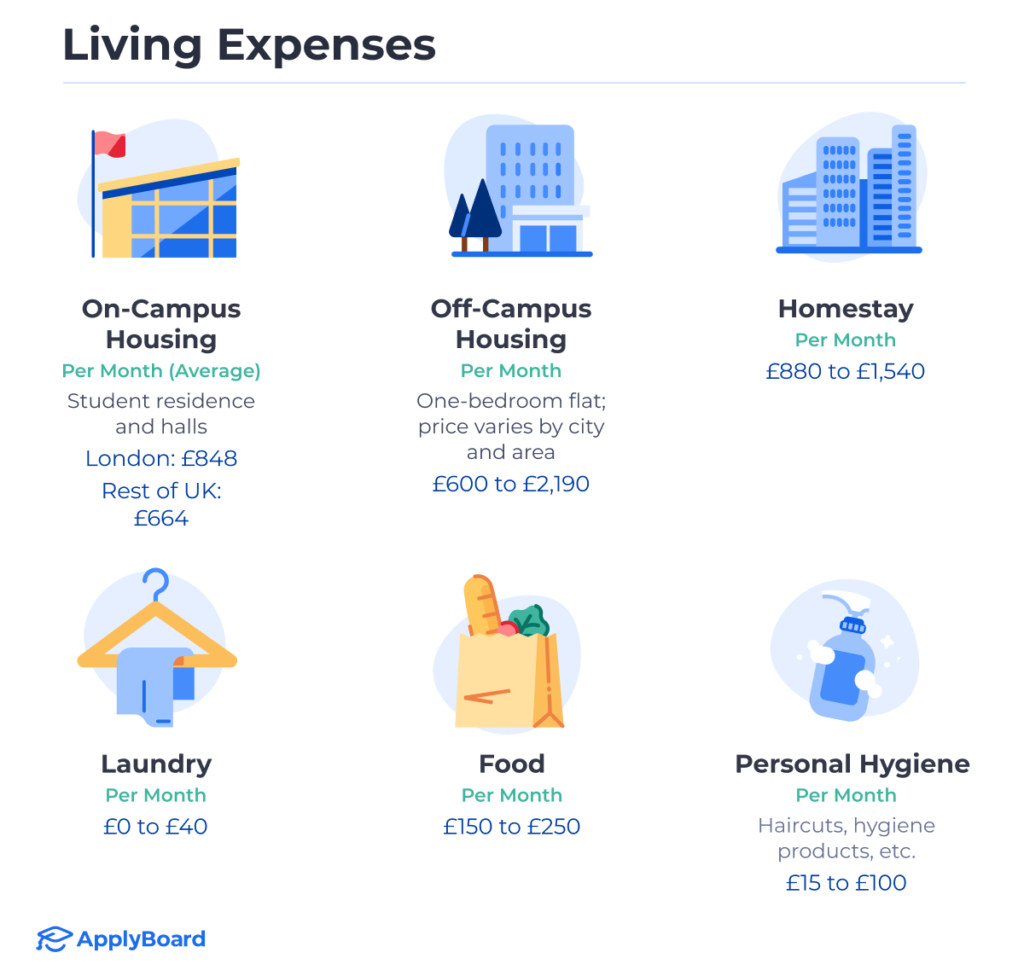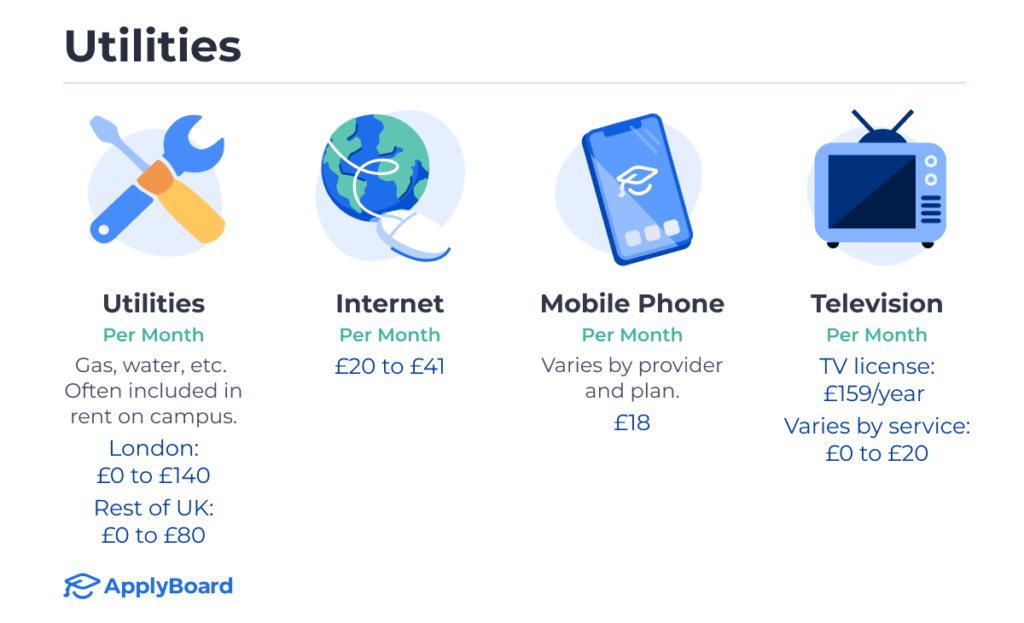The United Kingdom (UK) is home to some of the most prestigious universities and colleges in the world. If you intend to become an international student in the UK, it’s essential to plan for your tuition, accommodation, and everyday expenses. (In fact, proving you can cover those costs is part of applying for your student visa). Below, we’ll take a closer look at the current cost of living in the United Kingdom to help you build your budget.
Your cost of living will vary depending on which part of the UK you’re studying in. Generally, living in London is more expensive than in other parts of the country. While these numbers are current as of August 2024, it’s a good idea to check a cost of living calculator before setting your final budget because the cost of living changes regularly.
Preparing to become an international student? Our UK Student Guide can help you get ready.

Accommodation and Living Expenses
Let’s take a closer look at some essential expenses. When researching accommodations, it’s important to understand what each option offers. Does your student residence include meals? If so, it might seem more expensive at first, but will save you money in the long term because groceries are covered. Or, does your off-campus rent not include utilities? If so, it’s important to budget for higher heating bills in the winter, or water bills in the summer.
To help you understand the average cost of living expenses in the UK, we’ve highlighted some key expenses below (current as of August 2024):1

Many international students work part-time to cover their expenses. Could one of these part-time jobs for students in the UK be a good fit for you?

Utilities
“Utilities” refers to the supply of gas (or other heating fuel), water, and electricity to your home. You’ll usually be billed on a monthly or quarterly basis, and the amount will depend on how much of each utility you used. In the UK, it’s common for rent to include some or all of these utilities, but this isn’t always the case. If you must pay for your utilities separately, they can increase your budget as an international student.
Your phone, television, and internet plans are also considered utilities, but these are almost always paid independently of your rent. Consider using comparison sites to check for promotions on different plans: a little bit of research can help you save money!
Here’s a quick look at some average utility costs in the UK:2

Utility costs may vary depending on:
- Local climate
- Provider options
- Your lifestyle
- The regulations in your city and region
- Location
- Whether you need a TV licence for your streaming subscriptions
- If you bundle bills (like internet, TV, and phone) for a better deal
If you’re buying a new phone in the UK, paying it off quickly or buying it right away can noticeably lower your monthly payments. If you’re bringing a phone to the UK, you’ll need to buy a SIM card and sign up for a UK phone plan once you land. So, do your research beforehand to find a carrier and plan you like with a price that makes sense for your budget. Watch for special deals for students at the start of the school term, too.
If you’re sharing accommodations with other people, it’s important to talk about and agree on who pays which utility bills, when, and how much. An even split is the most common approach. However, if one of your roommates takes really long showers, for example, it could make sense for them to pay more of the water bill.

Leisure
If you want to stick to a budget while studying in the UK, it’s good to understand what you spend on leisure activities. This is especially true in London, which is one of the world’s most expensive cities. Treating yourself to new experiences is part of being an international student. Just remember that balance is crucial, and student discounts can help you have fun while staying on budget.
We’ve shared the average cost of different leisure activities below. Whether you love traveling, early mornings at the gym, or coffees with friends, here are some average costs:3

Living in the UK means that many incredible destinations are only a short trip away. Here are our top five tips to travel affordably as an international student.

Transportation and Academic Supplies
Your housing choices will also impact your monthly transportation costs.4 If you choose to live on-campus, you’ll save a few pounds by living close to your classes. If you live off-campus, you’ll have to travel from your home to the campus, which can cost more. Fortunately, most academic institutions offer students a discounted transit pass. Check in with your institution to learn about the deals on transportation they offer their students.

There are also travel discounts at the city and national level. Here are a few to watch for:
- When traveling between cities, full-time students can buy a Young Person’s Railcard, which can save them 30% on train fares.
- Studying in London? Save on your tube (metro/subway) rides with an Oyster Student Card.
- If you’re under 22 years old, and studying in Scotland for more than six months, you might be able to ride for free on most of the nation’s bus services through the Young Person’s Free Bus Travel Scheme.
- Part-time and full-time students in Wales can save up to 34% on rail transit with the Student Railcard.
The estimate above for “books and supplies” is an average monthly cost and covers a variety of academic supplies, including textbooks, binders, and pens.5
The cost of supplies can vary depending on your:
- Access to textbooks
- Course material requirements
- Level of study
- Field of study
Remember, some books or textbooks may be borrowed from the city’s or institution’s libraries. Or, where possible, check student social media pages or the campus bookstore for second-hand copies. Some students also choose to rent their textbooks on Amazon.
Take a closer look at how international students can get health and travel insurance in the UK.
Now that you have an idea of what the cost of living in the United Kingdom is, use these estimates to start budgeting for your time abroad.
Find the academic institution and course matching your goals on the ApplyBoard platform!
FOOTNOTES:
1. Sources include: Study UK (British Council), “Cost of studying and living in the UK.” (on-campus housing); Numbeo, “Cost of living in United Kingdom.” (off-campus housing) Homestay sources include HFS London, “Homestay Prices (2024) and The University of Edinburgh, “Homestay Accommodation – Packages and Prices.” University of Hertfordshire, “Cost of living” (laundry). University of Surrey, “Living Expenses in the UK for International Students” (groceries). Worldmetrics.org, “Average Haircut Prices Around the World” (hygiene).
2. Sources include: Study UK (British Council), “Cost of studying and living in the UK” (utilities in London, mobile phone). University of Hertfordshire, “Cost of living” for utilities outside London. The Independent, “What is the average broadband bill in the UK?” (Internet). Chris Knight, MoneySavingExpert. “Watch movies & TV online” (TV/streaming)
3. All numbers in this chart are from Numbeo, “Cost of Living in United Kingdom” except “General Entertainment” and “Travel/Holidays,” which is from University of Hertfordshire, “Cost of living” and the high end of “Dance Club Entry,” sourced from Nicholas Dawson in Express, “UK’s biggest party cities and how much nights out cost…“
4. The number in the chart below is sourced from: University of Hertfordshire, “Cost of living.”
5. Times Higher Education, “The cost of studying at a university in the UK as an international student.”



